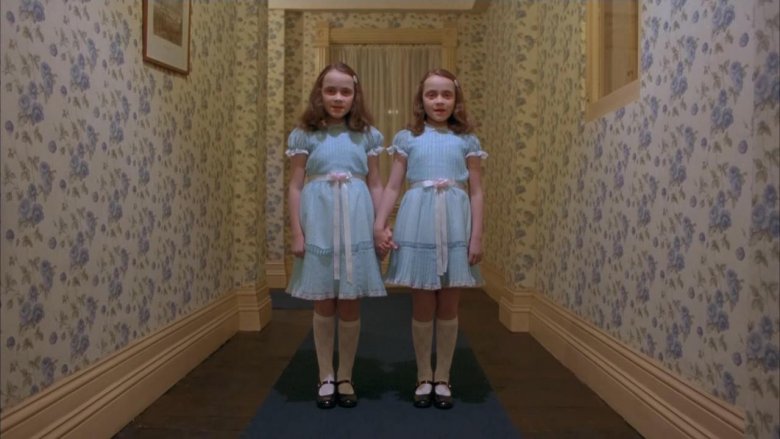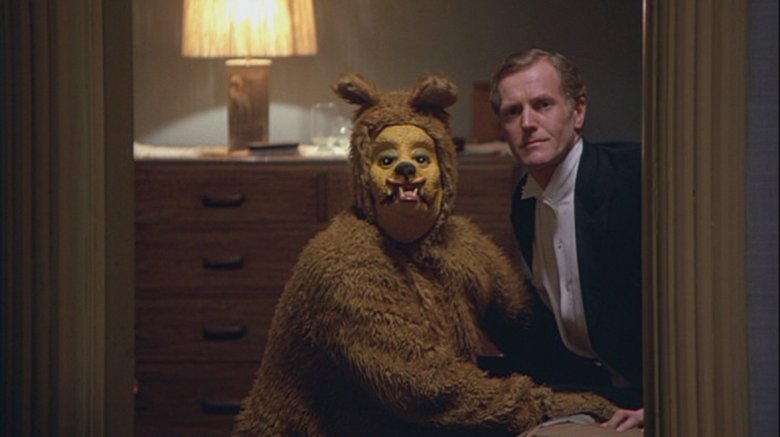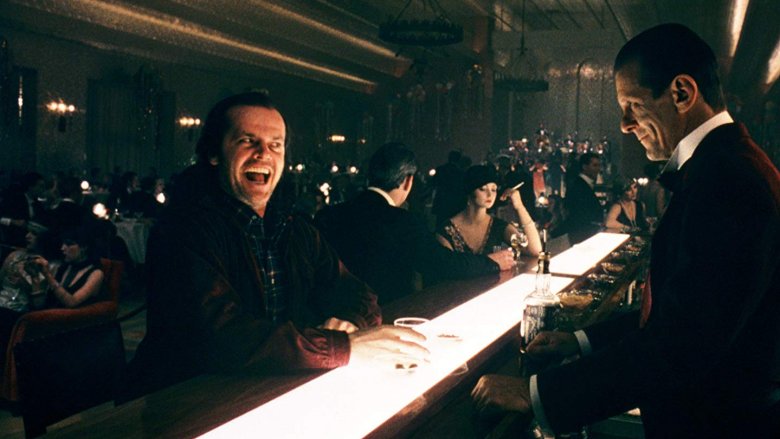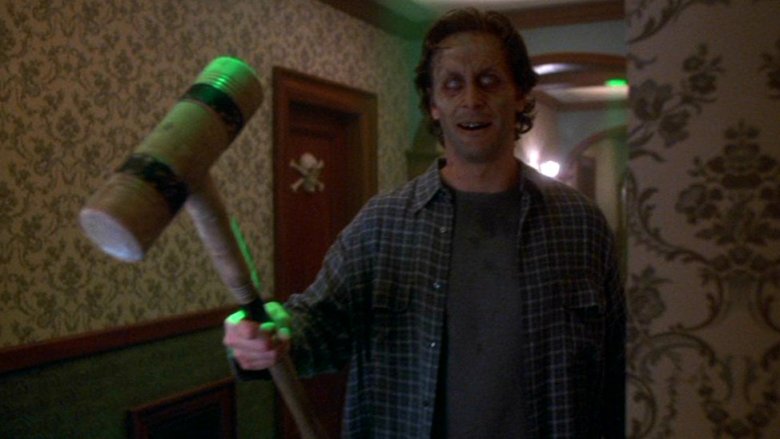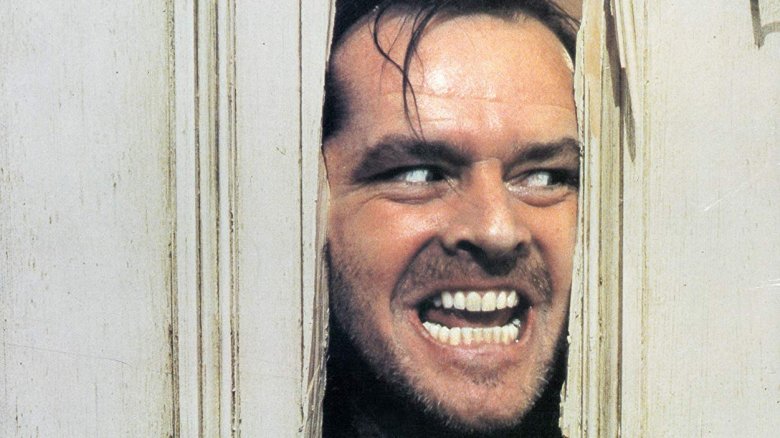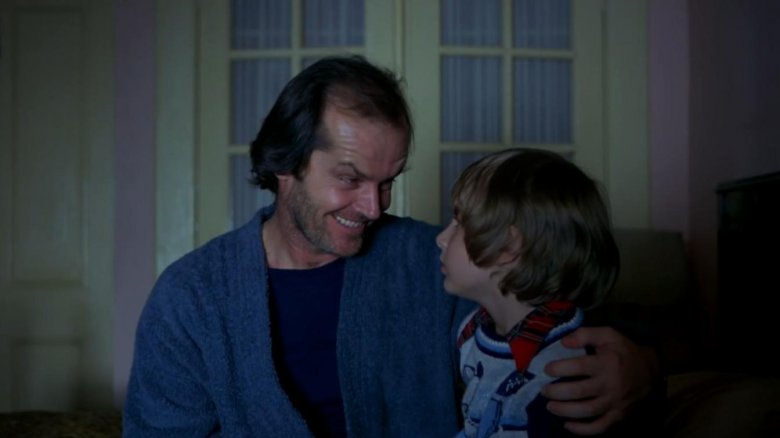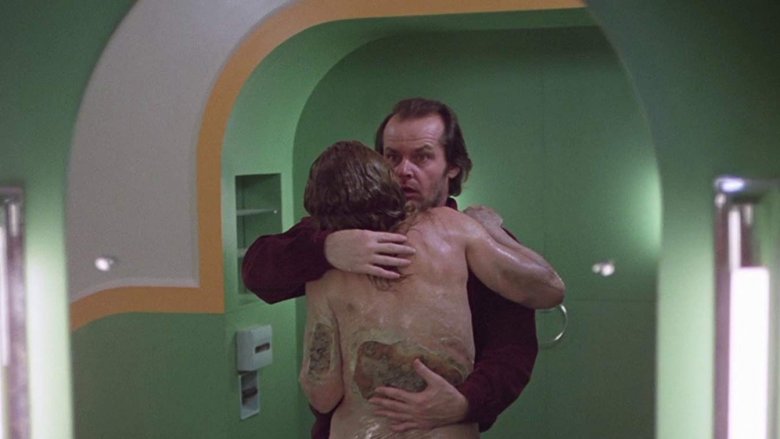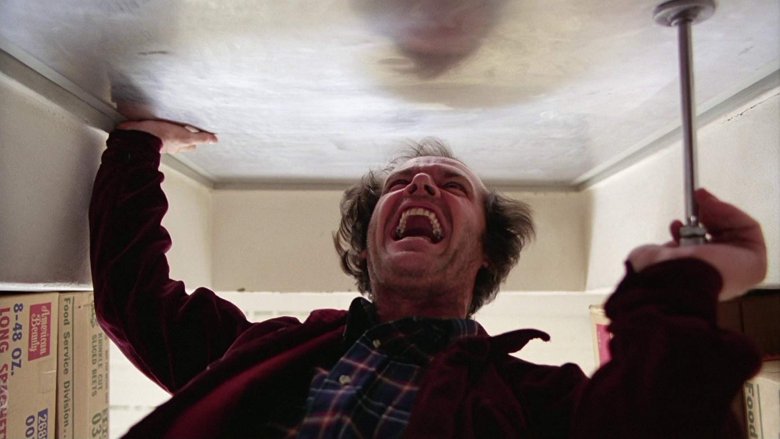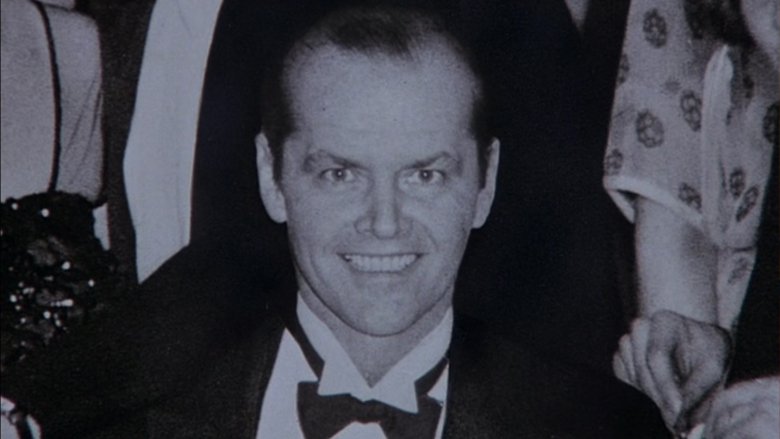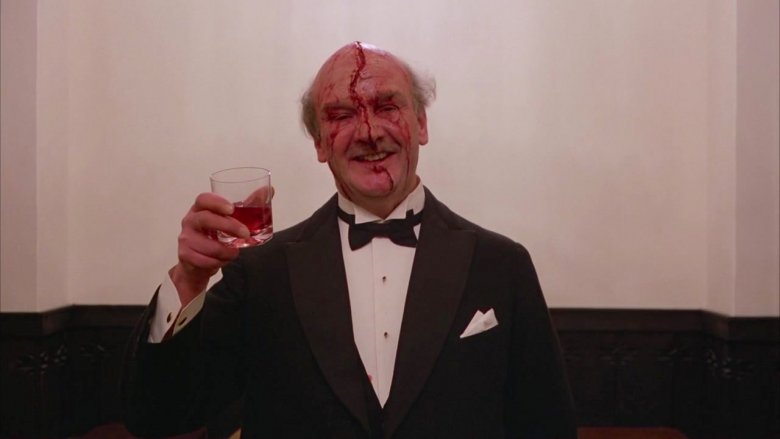Ghosts Aren't The Scariest Part Of The Shining
We may receive a commission on purchases made from links.
The Shining is without question one of the most beloved and best regarded horror movies of all time, currently sitting at number two behind only (surprise) The Exorcist on the list of the 1,000 best horror movies at They Shoot Zombies, Don't They?, a weighted list aggregated from hundreds of "best of" lists. It's also incredibly iconic; even those who have never seen the movie would recognize its most lasting scenes, lines, and images. "Redrum," "Here's Johnny," and "All work and no play make Jack a dull boy" are all references that many people would find familiar, even if they couldn't name the movie they were from.
But there are plenty who do recognize the source of these references and who love them devotedly, inspiring everything from a bar with visuals and cocktails themed around the movie to neckties featuring the Overlook's distinctive carpet design. But what's more, there are those who study them intimately. The Shining is probably one of the most discussed and analyzed movies ever made in any genre, due partly to the mystique surrounding its director, Stanley Kubrick, but also due to the fact that it's just straight-up pretty darn scary. What is it about the movie that causes it to linger so powerfully in the public consciousness? Is it the ghosts? The ax murders both attempted and successful? The dude in the bear suit going to town on that other dude? The cascade of blood gushing from the elevators? Or is there something more primal and visceral that sticks with us?
Heads up: Heeeeeeeere's spoilers!
Spirits of the Overlook
A lot of horror movies seem to lose their horrific impact over time; surely very few people today above elementary school age would find much to be afraid of in the classic Universal chillers of the '30s and '40s, despite their contemporary reputations. There is no shortage of reasons for this, including evolving social mores and a broadening of what is seen as acceptable in popular culture leading to desensitization, and so on. But whatever lies behind this phenomenon, the fact is that The Shining has, over the course of nearly 40 years, maintained its reputation as one of the scariest movies ever made, and indeed that reputation has arguably grown over that time.
A big part of its success comes from shrewdly playing up the physical space: an enormous, quiet, empty hotel that maybe isn't quite as empty as advertised. The fear that we all experience in a big, empty building that anything could be lurking around the corner is literalized when Danny turns a corner on his tricycle and encounters the ghostly Grady twins, possibly the most iconic spookums in a movie full of iconic images. Soon the Overlook is full to bursting with ghosts: bartenders appearing from nowhere, revelers with bleeding scalps, parties filling ostensibly empty ballrooms, naked ladies who aren't what they seem, and, you know. The guy in the costume. The lingering notion that anything could be anywhere at any time the way the hotel ghosts are is one that tends to stay with viewers way more than any jump scare.
A flood of fan theories
In fact, this feeling of doubting your own senses and the ambiguity of what should theoretically be objective reality are a big part of why The Shining remains the major cultural touchstone that it is. The Shining poses a lot of questions that are not necessarily answered in the film itself, or at least not without close or repeated viewings. And close critical readings of The Shining are something of a cottage industry within film criticism; ask a group of movie nerds what The Shining is "really" about, and the answers will come pouring out like blood from the Overlook's elevators (or is it blood? What if it's actually a mix of whiskey and the metaphorical red of Jack's anger, the two things that blah blah blah blah???).
Deep readings of The Shining are so common that there's actually a documentary on the phenomenon, called Room 237 after the notorious hotel room where something happens to Danny. According to people in this documentary, The Shining is, despite appearances, actually a movie about American imperialism and the genocide of Native Americans. Or, actually, it's about the Holocaust and that genocide. Or it's a secret retelling of the myth of Theseus and the Minotaur. Or, maybe most famously, it's Stanley Kubrick's secret confession that he was involved in faking the Moon landing. Did you know that if you play the movie forward and backward at the same time, stuff happens? It's a lot.
Anyway, one thing we can all agree on is that this is definitely a movie about a haunted hotel, right? ...right?
What if there are no ghosts?
A relatively common strategy in horror movie criticism is to ask what's really happening in the movie if nothing supernatural were actually present in the events of the film. The goal is to figure out what the supernatural presence is a metaphor for and thereby get to the thematic meat of the film, more or less. If, for example, there are no ghosts in The Haunting, it becomes a story of a woman experiencing a mental breakdown after trying and failing to find her place in the world. Dracula becomes a movie about paranoid English guys murdering a foreigner because they're afraid he'll corrupt their women. Stuff like that. Supernatural events become the result of dreams, hallucinations, rumors, and urban legends. While this can often be a useful tool for looking at stories from a new angle, it's not universally helpful because sometimes it's a refusal to engage with a genre on its own level and also the idea that there can't be ghosts in a work of fiction because obviously there aren't ghosts in real life is Olympic-level mental gymnastics.
That said, there maybe weren't any ghosts in the Overlook Hotel. Roger Ebert's review of The Shining, for example, features the fairly common interpretation that "Kubrick is telling a story with ghosts ... but it isn't a 'ghost story,' because the ghosts may not be present in any sense at all except as visions experienced by Jack or Danny." But if this is true and the ghosts aren't even a thing, then what's the real threat to the Torrance family?
The King of Hate
If you only know one piece of trivia about Stanley Kubrick's Shining adaptation, it's likely the fact that author Stephen King famously hates it. He hates it so much that he had it remade as a TV mini-series in the mid-'90s starring the fourth most famous person from the sitcom Wings in the Jack Nicholson role. If you haven't seen it, here's a spoiler: It's bad. But King is happier with it as an adaptation than he is with a film regarded as a crowning achievement in a genre and one of the best films of the most admired directors of all time. "Why?" you might rightly ask yourself. "Why would King hate Kubrick's The Shining so much?"
Well, according to King himself, much of it has to do with Jack's character. He never cared for the casting of Jack Nicholson, in part because Nicholson was so well known for his role in One Flew Over the Cuckoo's Nest, in which he plays a patient at a mental hospital. This, King thinks, gives away the game that Jack will go crazy. In fact, King argues that "the character of Jack Torrance has no arc in that movie. Absolutely no arc at all. When we first see Jack Nicholson ... he's crazy as a sh*t house rat. All he does is get crazier." For King, the tragedy of the story is seeing an ordinary man overwhelmed by evil, and Kubrick's adaptation loses that sense of tragedy. Consider, though: What if this is only part of the reason?
Scary Sue
See if you can tell who this is describing: a writer and a father of a young child, whose issues with rage and substance abuse manifest themselves as antagonism toward that child. Many of you likely correctly identified that sentence as describing The Shining's central character Jack Torrance, while others of you also correctly identified that sentence as describing The Shining's author Stephen King at the time of the novel's composition. As the AV Club points out, The Shining is King's most personal work and Jack Torrance is the character he most closely identified with. King's inspiration for the book came from his own very real occasional feelings of antagonism toward his own children, and he claims the book was an "attempt to get it out of my system, but it was also a confession."
While King's Jack is an ordinary man who is driven to violence — literally transformed — by the influence of alcohol and the evil presence in the Overlook, Kubrick says of his adaptation that "there's something inherently wrong with the human personality. There's an evil side to it." As King's criticism rightly points out, Kubrick's Jack is crazy and violent from the beginning. The hotel just gives him an outlet. So while King might say he doesn't like that Kubrick's film is "cold" or that it's like "a Cadillac with no engine in it," isn't it possible that he also doesn't like what the movie seems to say about him as a person? If Jack is bad from the start, what does that say about King?
Jack in a box
One of the better known analyses of Kubrick's The Shining comes from filmmaker and analyst Rob Ager, whose incredibly thorough look at the film gained a lot of mainstream attention due to its breakdown of how the (as Ager claims, intentionally) impossible geometry of the Overlook Hotel is meant to disorient the viewer. (Ager's analysis is arguably too thorough, as it falls into the common trap of assuming that Kubrick's reputation as a perfectionist means his films actually are perfect, and any "perceived" continuity errors must be thematically significant. That's a whole other discussion, though.)
One convincing line of argument, however, is that Jack is the real threat and that, indeed, there are no ghosts in the Overlook at all. As Ager puts it, "Time and again, ghostly visions reveal themselves under scrutiny to be dream sequences, reflections or hallucinations." Jack's visions are the result of cabin fever and/or alcohol withdrawal, Danny's "shining" visions are dreams, Dick Hallorann's almost cartoonish home decor is the result of a childish imagination, and so on. (The fly in this particular argument's ointment is the question of who lets Jack out of the storage closet, but Ager has an explanation for that as well if you want to dig into it.) If there are no ghosts in the Overlook Hotel, the only malevolent force, the only real danger, is Jack Torrance himself and the abusive behavior toward his wife and son that he brought into the hotel with him.
Which room was it
Let's look at one of the most notorious scenes in the film, the one the documentary was named after: the ghost in Room 237. Taking the film's narrative at face value, we see Danny lured to the room, which is thought to be locked but is instead open. He subsequently appears with bruising on his neck, saying a crazy woman tried to strangle him. Jack later investigates the room and finds the ghost of a naked woman who is at first attractive to him but then turns into an old crone with rotting flesh. He then tells Wendy he saw nothing.
Okay, so: If there are no ghosts in the Overlook, who strangled Danny, and how do you explain what Jack saw? Ager does a very thorough comparison of the layouts of the Torrance apartment and Room 237, but more importantly takes a look at an otherwise innocuous-seeming scene: the one in which Danny comes in for his toy truck and Jack tells him how much he loves him. The short version of Ager's breakdown is that this scene (which is notably scored with very dramatic and ominous music) is cut off before we can see Jack strangling Danny for waking him up. Danny never goes into Room 237, and neither does Jack. Jack's encounter with the woman in 237 is Danny having a dream that mirrors his own frightening experience with his father.
Mirror, mirror
Many commentators, especially those who espouse the "no ghosts" theory, have noted that in every scene in which Jack encounters a ghost, there is a mirror present (or in the case of the storeroom, a polished metal door). From one perspective, this could simply mean that Jack is literally seeing things — misinterpreting a reflection as something else. On a more symbolic level, it's a reflection of that evil side Kubrick sees in humanity. But the fact is that duality and reflection are everywhere throughout the film, from the Grady twins to Tony as Danny's double to the two Mr. Gradys to the second Jack in the photo at the end, and so on. Doubles are everywhere in The Shining.
An exceptional essay from Catapult goes into how the motif of doubles plays into the theory of the unheimlich – the uncanny, the idea of taking something familiar and twisting it just enough to make it unsettling. The Shining is all about ambiguity and doubt. Is the hotel haunted? Is Danny psychic? Is Jack possessed? This sense of uncertainty and unease is the same as that felt by victims of abuse. Is this a good day or a bad day? What will set my abuser off? The power dynamics of abuse are partly based on causing one's victims to doubt their instincts, creating false senses of security through doubt and gaslighting, turning a home into a place of insecurity and terror, as Jack does to Wendy and Danny, and, indeed, as the movie does to its viewers.
Everything old is new again
One of the most discussed shots in the film comes at the very end, after Jack has frozen to death and Wendy and Danny have escaped, when the camera slowly zooms in on a photograph from a July 4 party from 1921, which clearly shows Jack among the revelers in the ballroom. On the one hand, this could simply be a symptom of the fact that, as Kubrick said many times about the film, it's a ghost movie and not everything in a ghost movie needs to make sense. On the other hand, Kubrick also said quite clearly about this shot, "The ballroom photograph at the very end suggests the reincarnation of Jack." The idea of reincarnation is not isolated to Jack. There's also the implication that Charles Grady, the previous caretaker of the Overlook who murdered his family, is the reincarnation of Delbert Grady, the butler who tells Jack that he's always been the caretaker.
The idea of reincarnation not only reinforces the motif of doubles seen throughout the film, it also bears the symbolic weight of the cycle of abuse. Violence is often (but by no means always) passed down from one generation to the next, as our parents and others close to us are the ones who teach us how to behave and interact with others, even if only subconsciously. If the idea of The Shining is that the Overlook calls out to past inhabitants to test their moral mettle, we likewise have the decision between listening to our better angels, or, like Jack, giving license to our baser instincts.
Breaking the cycle
Somewhat ironically, the novel version of The Shining gives even more focus to the idea of the cycle of violent abuse by giving the story of Jack's father, himself a belligerent drunk who abused Jack. (While Jack's father does not appear and is not mentioned in the film, Rob Ager argues that his specter still haunts the film and in fact it is actually him talking to the bartender about accidentally hurting his son, thereby explaining the discrepancies between his version of events and Wendy's from the beginning of the film. Your mileage may vary on that.) Nevertheless, the film makes it clear that the history of violence at the Overlook goes back generations, literally to its foundation on stolen Native land. Violence begets violence, and the fact that Kubrick decided to leave the Overlook standing at the end (as opposed to King, who blew it up), lingering on the haunting image of former-life Jack, hints strongly at the immortality of evil.
While it seems at the end that Wendy and Danny have escaped Jack (and metaphorically the cycle of abuse), the track record at the Overlook seems to indicate that the lure of evil is hard to resist. While ghostly twins and deluges of blood are pretty spooky images, the idea that each of us plays host to potential violence that we must make an active choice each day to resist is a much more haunting idea. While constantly working to restrain our darker impulses may seem like it will make us dull boys, consider how it worked out for Jack.
